Passenger Car Intelligent Steering Market Expansion and Trade
The passenger car intelligent steering market is forecasted to expand from USD 24.29 billion in 2025 to USD 128.38 billion by 2034, growing at a CAGR of 20.32% from 2025 to 2034.
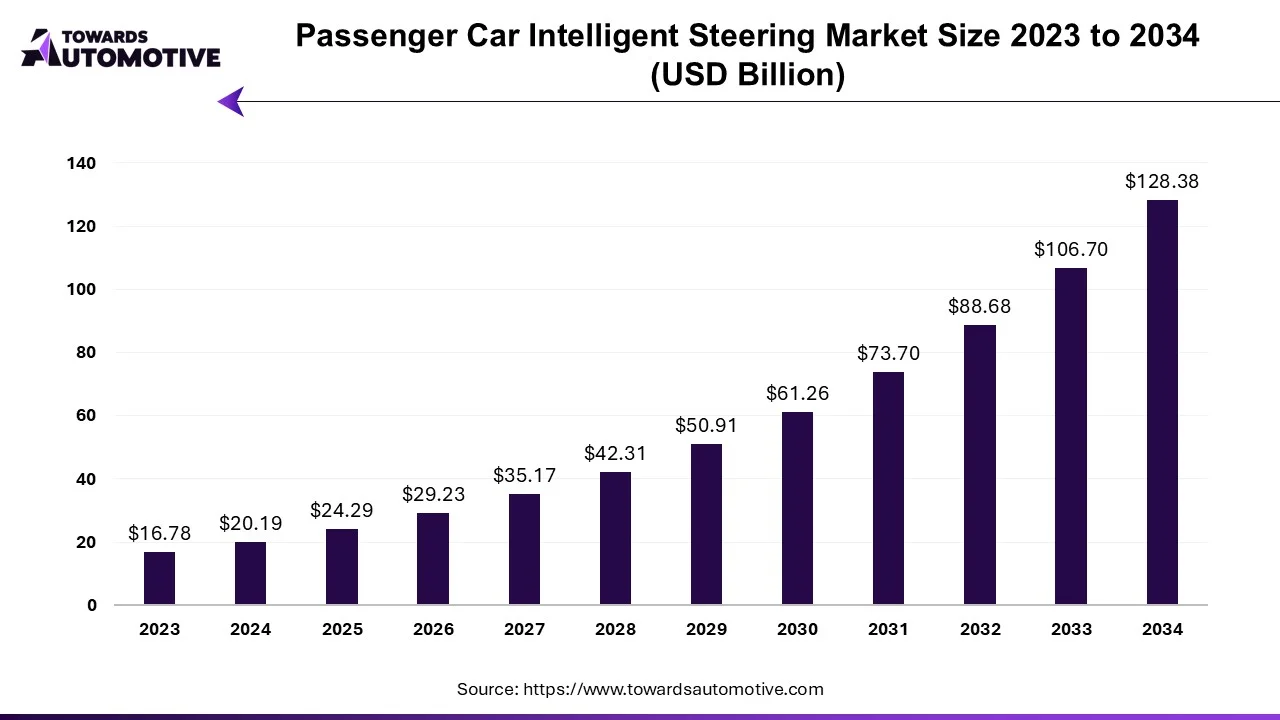
The passenger car intelligent steering market is experiencing rapid growth and technological innovation, driven by the increasing demand for safety, convenience, and automation in automotive vehicles. Intelligent steering systems play a crucial role in enhancing vehicle maneuverability, stability, and safety, offering drivers improved control and responsiveness in various driving conditions. As automotive technology continues to evolve, intelligent steering systems will play an increasingly integral role in shaping the future of mobility, paving the way for safer, smarter, and more connected vehicles on the road.
The passenger car intelligent steering market is witnessing remarkable growth as automotive technology continues to advance. With innovations such as autonomous driving and advanced driver assistance systems (ADAS) reshaping the automotive landscape, intelligent steering systems are becoming increasingly integral to the driving experience. This blog explores the dynamics driving the growth of the passenger car intelligent steering market, key components and functions of these systems, emerging trends, global market outlook, challenges, opportunities, and major players in the industry.
The market for intelligent steering in passenger cars is growing quickly because to reasons such the growing need for safety features, improvements in vehicle communication, and the emergence of autonomous driving technology. When it comes to improving a vehicle's agility, stability, and safety, intelligent steering systems are essential since they provide drivers more control and response under different driving circumstances. Intelligent steering systems have been a major area of focus for innovation and differentiation in the passenger car industry as automakers want to set their vehicles apart with cutting-edge technologies.
Key Components and Functions of Passenger Car Intelligent Steering Systems
- Electric Power Steering (EPS): Electric power steering systems use electric motors to assist steering efforts, providing variable steering assistance based on vehicle speed, driving conditions, and driver input. EPS systems enhance driving comfort, agility, and fuel efficiency compared to traditional hydraulic power steering systems, offering smoother steering feel and improved energy efficiency.
- Adaptive Steering: Adaptive steering systems constantly modify steering sensitivity and reaction according to the speed of the vehicle, the state of the road, and the preferences of the driver. Adaptive steering improves a car's handling, stability, and agility while maximizing steering feedback and feel for various driving situations, including city driving, interstate cruising, and parking manoeuvres.
- Lane Keep Assist (LKA): Lane keep assist systems utilize sensors and cameras to detect lane markings and assist drivers in maintaining their lane position. LKA systems provide steering corrections or alerts to prevent unintended lane departures, enhancing driving safety, and reducing the risk of accidents caused by driver distraction or drowsiness.
- Automated Parking Systems: Automated parking systems enable hands-free parking maneuvers by automatically steering the vehicle into parking spaces with minimal driver input. These systems use ultrasonic sensors, cameras, and advanced algorithms to detect parking spaces, calculate trajectory paths, and execute precise parking maneuvers, enhancing convenience and reducing the stress of parking in crowded urban environments.
Key Market Dynamics and Trends
- Integration with ADAS and Autonomous Driving: Intelligent steering systems are increasingly integrated with advanced driver assistance systems (ADAS) and autonomous driving technologies to enhance vehicle automation, safety, and comfort. As vehicle automation levels increase, intelligent steering systems play a crucial role in enabling features such as lane-keeping assistance, automated lane changes, and autonomous parking, paving the way for fully autonomous driving in the future.
- Connectivity and Vehicle-to-Everything (V2X) Integration: Connectivity technologies and vehicle-to-everything (V2X) communication enable intelligent steering systems to interact with other vehicles, infrastructure, and smart city systems, enhancing situational awareness and cooperative driving capabilities. V2X integration enables features such as cooperative collision avoidance, traffic flow optimization, and intersection coordination, improving overall road safety and efficiency.
- Electrification and Light Weighting: The electrification of powertrain systems and light weighting initiatives drive the adoption of electric power steering (EPS) systems, which offer energy efficiency benefits and compatibility with electrified vehicle architectures. EPS systems also contribute to vehicle light weighting efforts by eliminating the need for hydraulic components, reducing vehicle weight and improving fuel economy.
- Haptic Feedback and Driver Engagement: Intelligent steering systems incorporate haptic feedback technologies to enhance driver engagement, situational awareness, and safety. Haptic feedback provides tactile cues and vibrations to alert drivers of potential hazards, lane departures, or vehicle malfunctions, improving driver response times and reducing the risk of accidents caused by driver distraction or inattention.
Global Trends and Market Outlook
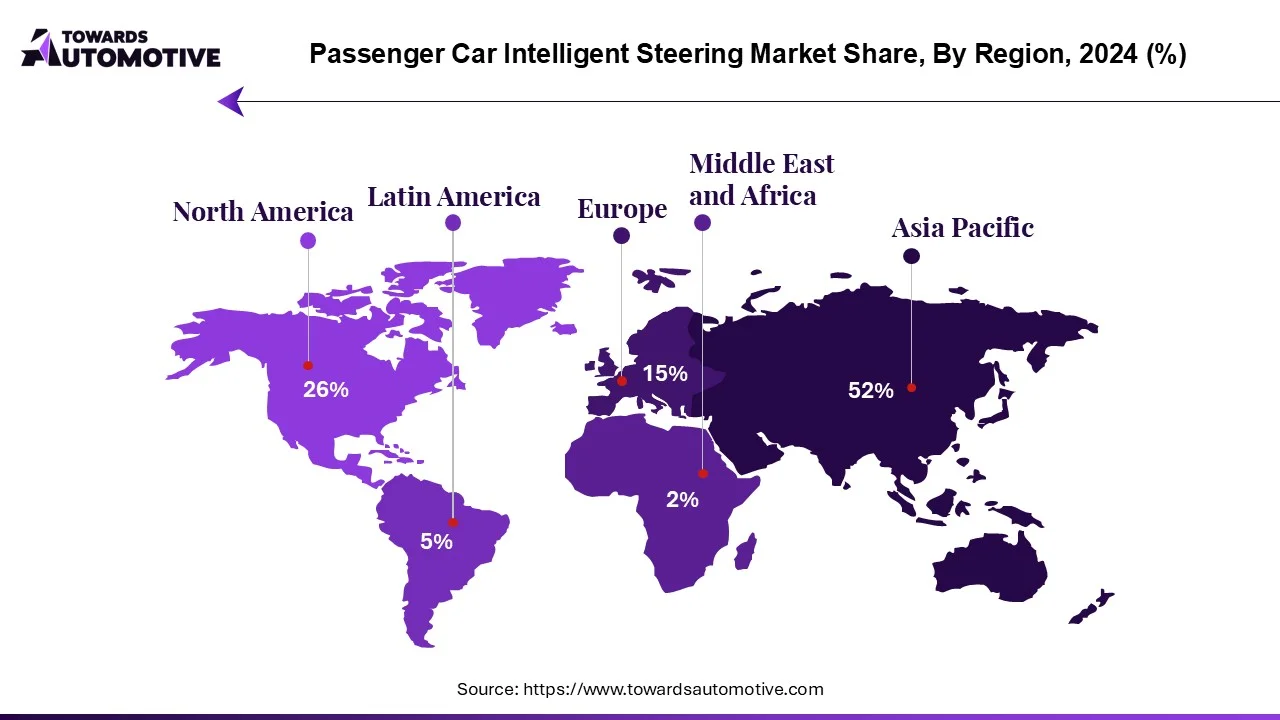
- Asia-Pacific Emerging as a Key Market: Asia-Pacific is witnessing significant growth in the passenger car intelligent steering market, driven by the rapid expansion of the automotive industry, increasing vehicle electrification, and rising demand for advanced safety and convenience features. Countries such as China, Japan, and South Korea are leading the adoption of intelligent steering systems, supported by government initiatives, technological innovation, and changing consumer preferences.
- North America and Europe Leading Innovation: North America and Europe remain at the forefront of innovation in the passenger car intelligent steering market, driven by the presence of leading automotive OEMs, technology suppliers, and research institutions. Cities such as Detroit, Munich, and Stuttgart serve as hubs for automotive innovation, with a focus on developing advanced steering technologies, ADAS integration, and autonomous driving solutions.
Challenges and Opportunities
- Cybersecurity and Data Privacy: Intelligent steering systems face cybersecurity risks related to unauthorized access, data breaches, and malicious attacks on vehicle control systems. Addressing cybersecurity threats requires robust encryption, authentication, and intrusion detection mechanisms to protect steering control algorithms, sensor data, and vehicle communication networks from cyber threats and vulnerabilities.
- Regulatory Compliance and Safety Standards: Regulatory compliance and safety standards play a crucial role in shaping the development and deployment of intelligent steering systems, ensuring adherence to industry regulations and safety requirements. Automotive manufacturers must comply with regulations such as ISO 26262 for functional safety, NHTSA standards for vehicle safety, and GDPR regulations for data privacy, to ensure the safe and reliable operation of intelligent steering systems.
- Consumer Acceptance and Adoption: Consumer acceptance and adoption of intelligent steering systems depend on factors such as perceived safety benefits, usability, and affordability. Automotive manufacturers must educate consumers about the advantages of intelligent steering technologies, address concerns related to system reliability and data privacy, and offer compelling value propositions to encourage widespread adoption and market acceptance of these systems.
Future of Automotive Electro-Hydraulic Power Steering Market
The automotive electro-hydraulic power steering market is projected to reach USD 30.78 billion by 2034, expanding from USD 20.45 billion in 2025, at an annual growth rate of 4.65% during the forecast period from 2025 to 2034.
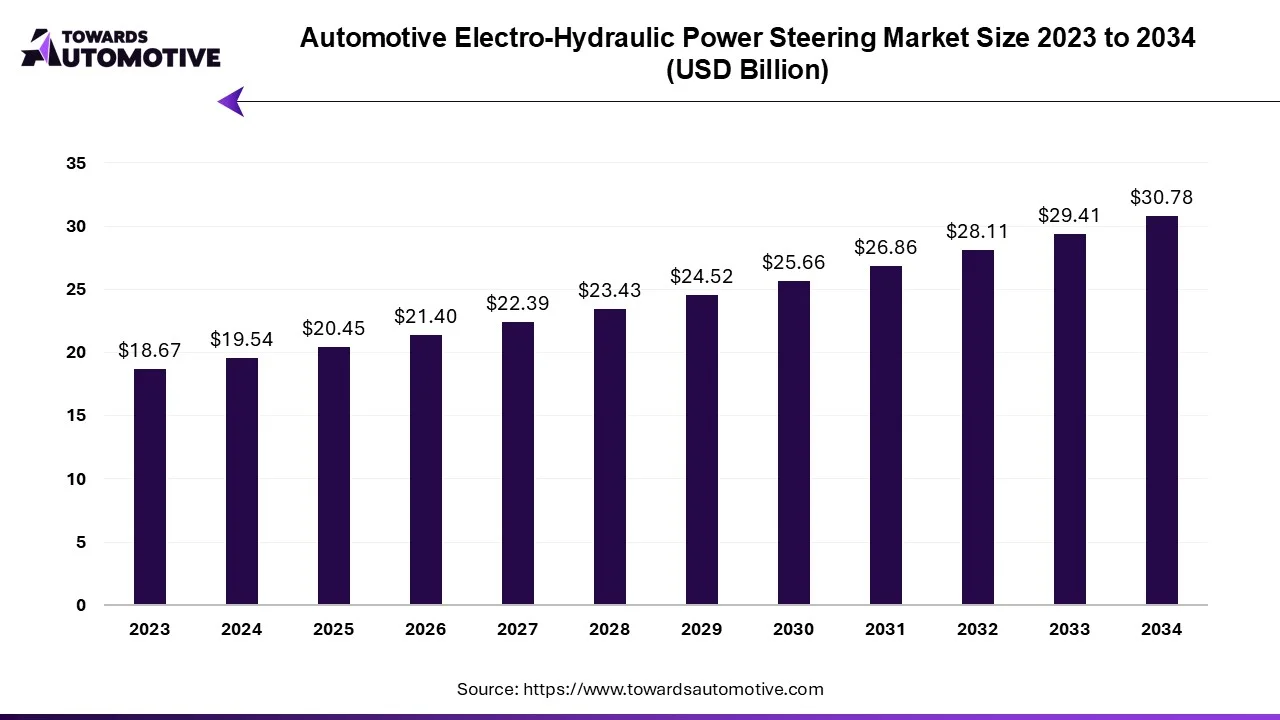
In the long term, increased R&D investments of major industry players, increased sales of electric and hybrid vehicles, and increased demand for the automotive industry are due to the growth of e-commerce. It positively affects the growth in the automotive electro-hydraulic power sector by helping to create demand in the automotive and transportation sectors. Factors such as the high cost of electro-power steering systems and major manufacturers' focus on cost reduction may hinder the growth of the automobile electro-power steering system business.
Future of Steering Tie Rod Market
The steering tie rod market is set to grow from USD 19.45 billion in 2025 to USD 33.14 billion by 2034, with an expected CAGR of 6.1% over the forecast period from 2025 to 2034.

The steering tie rod market is poised for substantial growth in the coming years, with significant opportunities emerging in South Asia and Pacific, East Asia, and Latin America. This growth is driven by an increasing demand for vehicles and advancements in automotive technology. This report delves into the factors contributing to this growth, regional market dynamics, and future projections. The automotive market valued at USD 4,070.19 billion in 2023, is experiencing growth and is projected to surpass USD 6,678.28 billion by 2032, with a significant CAGR of over 5.66%.
Future of Automotive Steering Market
The automotive steering market size is expected to increase from USD 37.9 billion in 2025 to USD 105.43 billion by 2034, growing at a CAGR of 12.04% throughout the forecast period from 2025 to 2034.
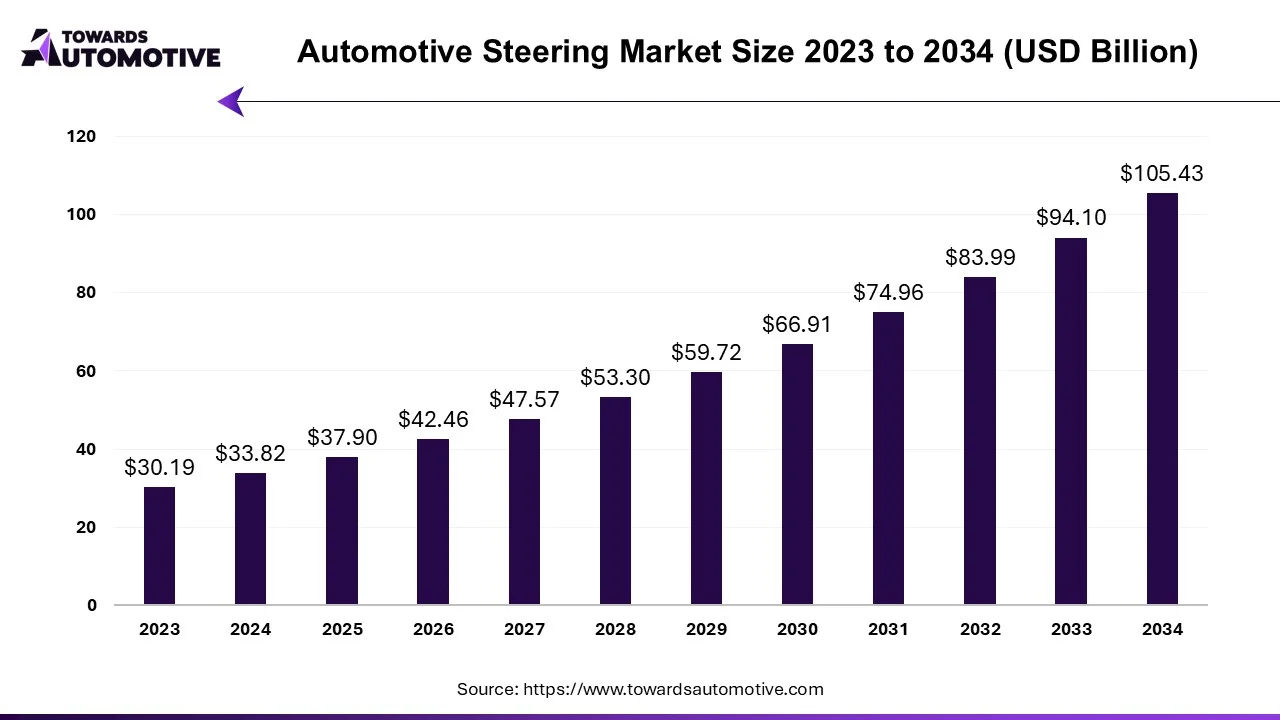
The automotive steering market is an integral sector of the automotive industry. This industry deals in manufacturing and distribution of steering systems for automotives. There are different types of automotive steering available in the market consisting of electric power steering (EPS), hydraulic power steering (HPS), electro-hydraulic power steering (EHPS) and manual steering. These steering systems are designed for several types of vehicles consisting of passenger cars, light commercial vehicles and heavy commercial vehicles. The rising sales of electric vehicles across the world has increased the demand for automotive steering, thereby boosting the industrial expansion to some extent. This market is projected to rise significantly with the growth of the automotive components industry in different parts of the world.
Future of Automotive Steering Torque Sensor Market
The automotive steering torque sensor market is expected to grow from USD 9.3 billion in 2025 to USD 18.49 billion by 2034, with a CAGR of 7.93% throughout the forecast period from 2025 to 2034.
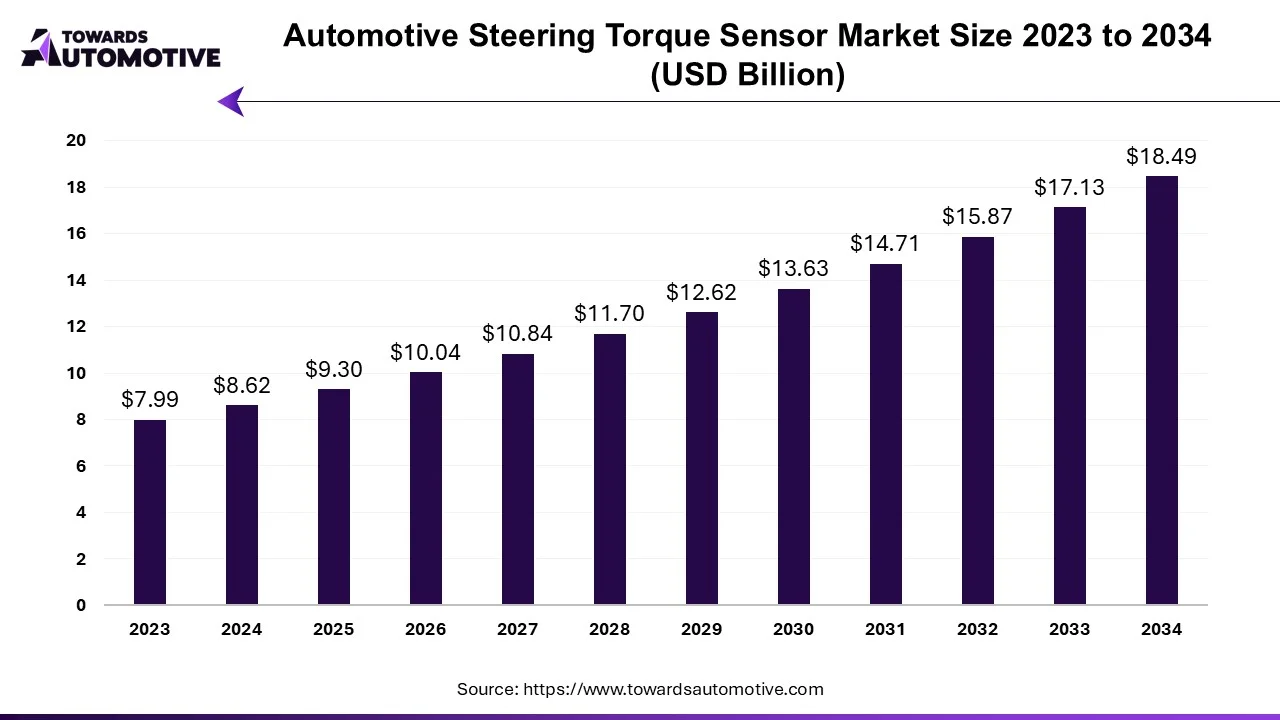
The automotive steering torque sensor market is a crucial sector of the automotive industry. This industry deals in manufacturing and distribution of automotive steering torque sensors across the world. There are several types of torque sensors available in the market comprising of analog torque sensors, digital torque sensors, wireless torque sensors and others. These sensors are designed for different vehicles consisting of passenger cars, commercial vehicles, electric vehicles and some others. It has various applications in steering assist systems, adaptive cruise control systems and lane departure warning systems. The growing sales of commercial vehicles in different parts of the world has boosted the market growth. This market is expected to grow drastically with the rise in the automotive technology sector across the globe.
Key Players in the Passenger Car Intelligent Steering Market
The passenger car intelligent steering market comprises a diverse ecosystem of automotive OEMs, tier-1 suppliers, technology providers, and research organizations collaborating to develop and commercialize advanced steering solutions.
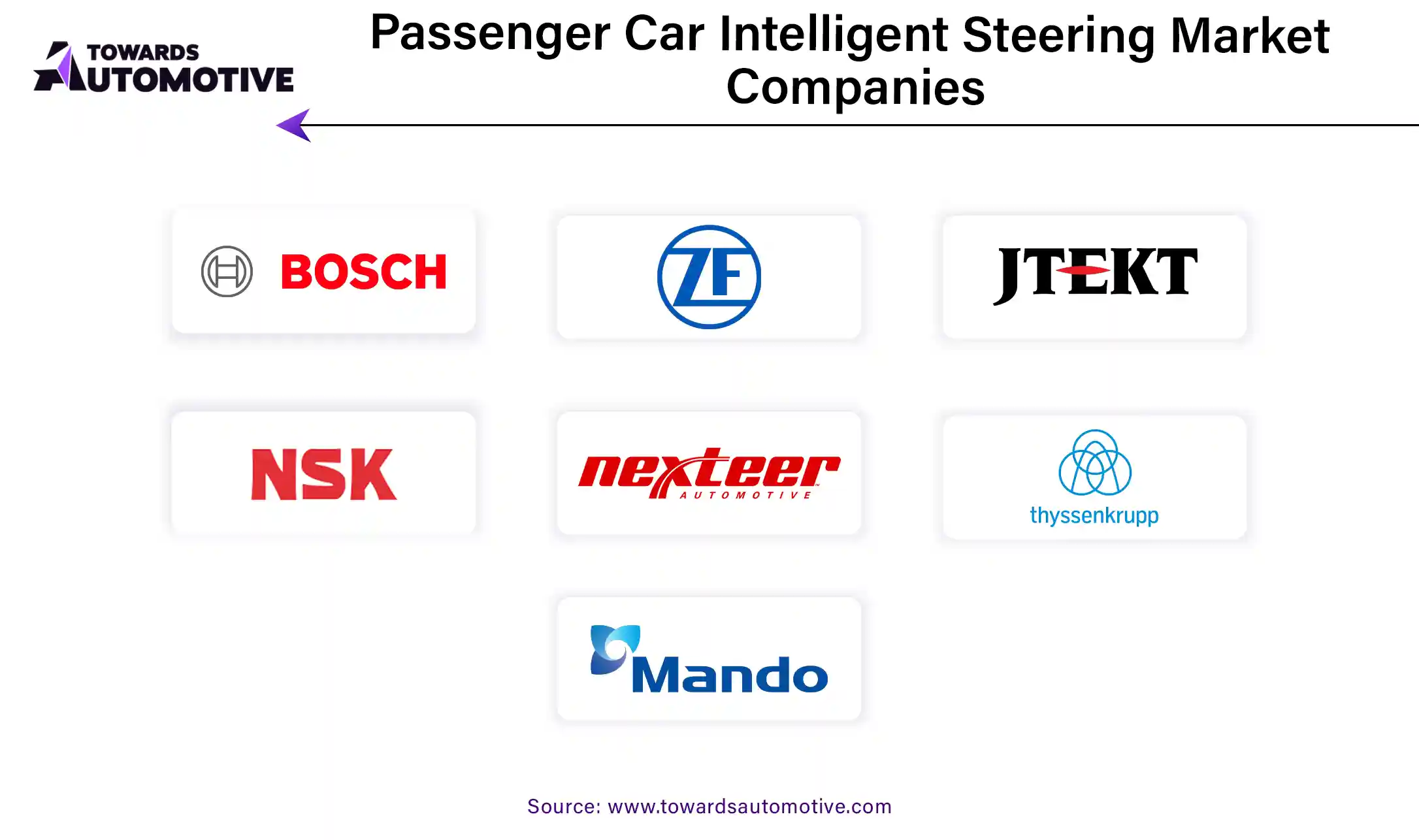
Some of the prominent players in the market include
- Robert Bosch GmbH
- ZF Friedrichshafen AG
- JTEKT Corporation
- NSK Ltd.
- Nexteer Automotive Group Limited
- Thyssenkrupp Presta AG
- Mando Corporation
- China Automotive Systems, Inc.
- Hyundai Mobis Co., Ltd.
- Mitsubishi Electric Corporation
Recent Developments in the Passenger Car Intelligent Steering Market
- In December 2023, BMW introduced its latest passenger car model equipped with intelligent steering technology. The system, known as BMW Intelligent Personal Assistant, integrates advanced sensors and algorithms to provide semi-autonomous driving capabilities. It offers features such as lane-keeping assistance, adaptive cruise control, and automated parking, enhancing safety and convenience for drivers.
- Audi unveiled its Audi AI Traffic Jam Pilot system in November 2023, featured in its premium passenger car lineup. The intelligent steering system enables hands-free driving in congested traffic conditions, utilizing high-resolution cameras, radar sensors, and precise mapping data to navigate through traffic and maintain safe distances from other vehicles.
- Mercedes-Benz announced the integration of its Drive Pilot system into its passenger car fleet in October 2023. The Drive Pilot employs a combination of cameras, LiDAR sensors, and artificial intelligence to enable autonomous driving functions on highways and limited-access roads. The system enhances vehicle control, reduces driver fatigue, and improves overall safety during long-distance journeys.
- Volvo Cars introduced its IntelliSafe Autopilot system in September 2023, available in select passenger car models. The Autopilot system incorporates advanced steering assist features, collision avoidance technology, and intelligent cruise control to provide a seamless driving experience. It emphasizes safety, comfort, and ease of use for drivers navigating various road conditions.
- Tesla Motors continues to enhance its Autopilot system, with regular software updates providing new intelligent steering functionalities to its passenger car lineup. These updates include improvements in lane-keeping capabilities, adaptive cruise control performance, and enhanced traffic-aware navigation, offering Tesla drivers an increasingly autonomous driving experience.






